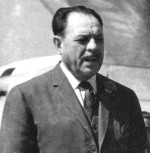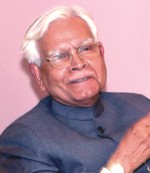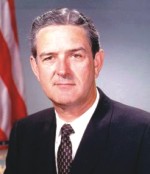|
Musings
All those Peripatetic People
Syed Badrul Ahsan
Sirajul Hossain Khan died last week. Those of us who have had cause to know him, maybe even interact with him, will surely have reason to recall the reasonably good journalist he was in his time, until he went into politics through joining the military regime of General Hussein Muhammad Ershad. It is quite intriguing that even a couple of days before Khan became a minister, he strenuously denied what he called rumours of his linking up with the dictator. It was therefore rather a shock for us when he proved the rumours true. The shock was not so much the truth that he was becoming a minister as it was the reality of his ditching journalism for a berth in a regime operating on extra-constitutionality. We simply lost Sirajul Hossain Khan the day he became a politician. Then politics left him and in the last few years of his life he was not much in circulation.
 |
Ayub Khan |
When you remember the many times in which some otherwise good people have caused bad tremors to flow through your sensibilities, you will be inclined to the melancholic. Back in 1965, Altaf Hussain, the respected editor of Pakistan's leading English language daily Dawn, cheerfully joined the government of President Ayub Khan as minister for industries and natural resources. Why he chose to come down from a journalistic perch where Muhammad Ali Jinnah had placed him in the 1940s remains anyone's guess. But it is true, as conversations with some of his acquaintances have revealed, that in the 1960s Altaf Hussain, a Bengali from Sylhet, went about energetically looking for a ministerial position in the Ayub dispensation. He remained a minister till the fall of the regime in March 1969. No one remembered him after that, perhaps for all the right reasons in the world. But one Pakistani who has made sure the spotlight will not miss him is Syed Sharifuddin Pirzada. He was attorney general when Ayub Khan made him foreign minister once Z.A. Bhutto left the cabinet. And since that happened more than four decades ago, Pirzada has wormed his way into any administration dominated by the military. Some Pakistanis are quite fond of suggesting that Pirzada has regularly taken pleasure in ingratiating himself with any man who has seized power in a coup.
 |
Natwar Singh |
If you observe India and watch the tribulations Natwar Singh has been going through, you tend to wonder why good superannuated diplomats like him must make their way into politics. He could have sat in the twilight, written his memoirs and given us some insight into his worldview. Now politics appears to have tarnished his reputation in his final years. The Iraqi oil for food scam has sullied his image, so much so that all the good he could have done as foreign minister has now become a distinct non-possibility. Worse has been the knowledge that the ruling Congress party has disowned him, prompting him to marvel at the ingratitude even governments might demonstrate towards their own fallen on bad days. Go back to 1971, here in Bangladesh. Abdul Mutallib Malek was a respected man, a well-known Bengali who had served as Pakistan's ambassador abroad and was clearly leading a quiet life in retirement. But when he agreed to replace Tikka Khan as governor of a tottering, shrinking East Pakistan, he made sure that all the good he had done in his life would become subsumed to that last act of being a loyal Pakistani when his fellow Bengalis were struggling to drive Pakistan into the sea. He died unmourned, which is a pity.
 |
John Connally |
In 1988, a fairly good number of Bengalis were disappointed when ASM Abdur Rab seemed to be relishing his role as leader of the opposition in a parliament where Bangladesh's mainstream political parties were absent. He had been a fiery student leader and one of the more radical founders of the Jatiyo Samajtantrik Dal, a party that had defied the superman that Bangabandhu Sheikh Mujibur Rahman was. When Rab gave legitimacy to the Ershad regime, we found the act inexplicable. In similar fashion, when his fellow radical student leader turned JSD politician Shahjahan Siraj ended up joining the clearly rightwing Bangladesh Nationalist Party, we knew the anti-climactic had happened. And the good freedom fighter Major MA Jalil, if you recall, made his foray into politics as a purveyor of scientific socialism, whatever that meant. By the time he died (and that was a sudden happening in Islamabad), he had veered to the extreme right in his new avatar as an Islam-oriented politician.
There have always been peripatetic men in the world of politics. We have been appalled by some, enlightened by quite a few others. John Connally was Democratic governor of Texas on the day John F. Kennedy was assassinated in Dallas in 1963. Years later, he turned into a Republican, joined President Nixon and even entertained presidential ambitions of his own. And then he went into the twilight, nearly forgotten. The more enlightening ones have been Andre Malraux and Melina Mercouri. They came from different backgrounds and then ended up doing similar things in politics. Malraux served as Charles de Gaulle's minister for culture. In her native Greece, Mercouri acquired the same position following the restoration of democracy in 1974. Both have done a good job, which is not what you can say for sure about Arnold Schwarzennegger in California.
And Italy's Ilona Staller, a.k.a. Cicciolina? The porn star made a revealing entry into parliament, whipped up bits of frenzy here and there and at the end of it all made not much of a difference. But Britain's Glenda Jackson did, to our intense satisfaction.
Copyright
(R) thedailystar.net 2007 |
